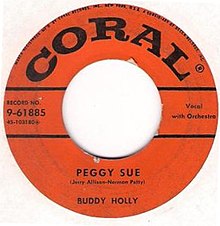Peggy Sue
| "Peggy Sue" | ||||
|---|---|---|---|---|
 |
||||
| Single by Buddy Holly | ||||
| from the album Buddy Holly | ||||
| B-side | "Everyday" | |||
| Released | September 20, 1957 | |||
| Format | 7" single | |||
| Recorded | June 29 and July 1, 1957, Clovis, New Mexico | |||
| Genre | Rock and roll | |||
| Length | 2:29 | |||
| Label | Coral 9-61885 | |||
| Writer(s) | Buddy Holly, Jerry Allison, Norman Petty | |||
| Producer(s) | Norman Petty | |||
| Buddy Holly singles chronology | ||||
|
||||
"Peggy Sue" is a rock-and-roll song written by Buddy Holly, Jerry Allison, and Norman Petty, recorded and released as a single by Holly in early July of 1957. The Crickets are not mentioned on label of the single (Coral 9-61885), but band members Joe B. Mauldin (string bass) and Jerry Allison (drums) played on the recording. This recording was also released on Holly's eponymous 1958 album.
The song was originally entitled "Cindy Lou", after Holly's niece, the daughter of his sister Pat Holley Kaiter. The title was later changed to "Peggy Sue" in reference to Peggy Sue Gerron, the girlfriend (and future wife) of Jerry Allison, the drummer for the Crickets, after the couple had temporarily broken up.
Appropriately, Allison had a prominent role in the production of the song, playing paradiddles on the drums throughout the song, the drums' sound rhythmically fading in and out as a result of real-time engineering techniques by the producer, Norman Petty.
Initially, only Allison and Petty were listed as the song's authors. At Allison's insistence, Holly was credited as a co-writer after his death. Joe B. Mauldin (string bass) and Allison (drums) played on the recording.
"Peggy Sue" went to number three on the Billboard Top 100 chart in 1957.
It is ranked number 194 on Rolling Stone magazine's 2004 list of the "500 Greatest Songs of All Time". It is ranked as the 106th greatest song of all time and the third best song of 1957 by Acclaimed Music. In 1999, National Public Radio (NPR) included the song on the NPR 100, a list of the "100 Most Important American Musical Works of the 20th Century". The song was inducted into the Grammy Hall of Fame in 1999.
...
Wikipedia
